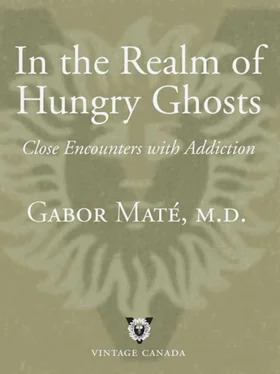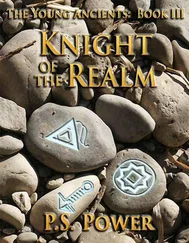“I can’t give up cocaine,” a pregnant patient named Celia once told me. “With my HIV, I have no energy. The rock gives me strength.” Her phrasing sounded like a morbid reconfiguration of the psalmist’s words: “ He only is my rock and my salvation; he is my defence. I shall not be moved. ”
“I enjoy the rush, the smell and the taste,” says Charlotte, long-time cocaine and heroin user, pot smoker and self-confessed speed freak.
“I guess I’ve been smoking or doing some form of drugs for so long, I don’t know…I think, What if I stopped? Then what? That’s where I get my energy from.”
“Man, I can’t face the day without the rock,” says Greg, a multi-drug addict in his early forties. “I’m dying for one right now.”
“You’re not dying for it,” I venture. “You’re dying because of it.” Greg is tickled. “Nah, not me. I’m Irish and half Indian.”
“Right. There are no dead Irish or dead Indians around.”
From Greg, more jollity. “Everybody has to go sometime. When your number comes up, that’s it.”
These four don’t know it, but beyond illness or the inertia of emotional and physical exhaustion, they are also up against the brain physiology of addiction.
Cocaine, as we shall see, exerts its euphoric effect by increasing the availability of the reward chemical dopamine in key brain circuits, and this is necessary for motivation and for mental and physical energy. Flooded with artificially high levels of dopamine triggered by external substances, the brain’s own mechanisms of dopamine secretion become lazy. They stop functioning at anywhere near full capacity, relying on the artificial boosters instead. Only long months of abstinence allow the intrinsic machinery of dopamine production to regenerate, and in the meantime, the addict will experience extremes of physical and emotional exhaustion.

Aubrey, a tall, rangy, solitary man now approaching middle age, is also hooked on cocaine. His face is permanently lined by sadness, and his customary tone is one of resignation and regret. He feels incomplete and incompetent as a person without the drug, a self-concept that has nothing to do with his real abilities and everything to do with his formative experiences as a child. By his own assessment, inadequacy and the sense that he was a failed human being were part and parcel of his personality before he ever touched drugs.
“After Grade Eight I grew up on drugs,” Aubrey says. “When I turned to drugs, I found that I fit in with other kids…Yeah, it was a big important thing, to fit in. See, as a kid when you picked somebody for a soccer game, I was always the last guy to be picked.
“See,” he continues, “I’ve been in institutions a lot, I’ve spent a long time in a four-by-eight cell. So I’ve been by myself a lot. And before then, too. See, I had a rough childhood, going from foster home to foster home. I was shipped off quite a bit, eh.”
“At what age were you sent to foster homes?” I ask.
“About eleven. My father was killed, hit by a truck. My mother couldn’t take care of all of us kids, and so Children’s Aid stepped in. Me being the oldest, they took me out. I got two brothers. They were younger. They stayed home.”
Aubrey believes he was chosen for foster care because he was “so hyper as a kid” that his mother couldn’t handle him.
“I was there for five years. Well, not in one place. No. I got shipped around. They’d keep me for maybe a year and then they couldn’t…and I had to go to another one.”
“How did it feel to be shunted about like that?”
“It hurt me. I was feeling like I wasn’t wanted. I was just a kid…It’s like, I’m a kid and nobody wants me. Even in school. The nuns taught me, but I never learned to read or write or nothing. They just pushed me from one class to another…I was always disciplined for something, and they’d take me out of that class and put me in a class for four-or five-year-old kids…so I felt so uncomfortable. It was hard for me. I felt stupid. I’m sitting there with all these little kids around me, looking at me. The teacher is teaching spelling…And they’re doing it and I can’t do it…I kept it all to myself. I didn’t want to talk for the longest time…I couldn’t even talk to people. I stuttered; I had a hard time explaining myself. I kept it all inside me for so long. When I get hyper I can’t talk proper…
“Strange, the cocaine calms me down. *4And the pot. I smoke five or six joints a day. That relaxes me, too. It takes the edge off. At the end of the day I just lay back with it. That’s just what happens, that’s my life. I smoke a joint and I go to sleep.”
Shirley, in her forties, addicted to both opiates and stimulants and stricken with the usual roster of diseases, also confesses to a sense of inadequacy without her drugs and sees cocaine as a life necessity. “I was thirteen when I first used. It took most of my inhibitions away, and my uneasiness, my inadequacies—how we feel about ourselves I guess is a better way to put it.”
“When you say inhibitions, what do you mean?” I ask.
“Inhibitions…it’s like the awkwardness a man and a woman feel when you first meet, and you don’t know whether to kiss each other, except I always felt that way. It makes everything go easier…your movements are more relaxed, so you’re not awkward anymore.”
No less a figure than the young Dr. Sigmund Freud was enthralled with cocaine for a while, relying on it “to control his intermittent depressed moods, improve his general sense of well-being, help him relax in tense social encounters, and just make him feel more like a man. ” *5 8Freud was slow to accept that cocaine could creat a dependence problem.
Enhancing the personality, the drug also eases social interactions, as Aubrey and Shirley both testify. “Usually, I’m feeling down,” says Aubrey. “I do coke, I’m totally a different person. I could talk to you a lot better now if I was high on cocaine. I don’t slur my words. It wakes me. It makes it easier to see people. I’ll want to start a conversation with somebody. I’m usually not very interesting to talk to…That’s why most of the time I don’t want to be with other people. I don’t have that drive. I stay in my room by myself.”
Many addicts report similar improvements in their social abilities under the influence, in contrast to the intolerable aloneness they experience when sober. “It makes me talk, it opens me up; I can be friendly,” says one young man wired on crystal meth. “I’m never like this normally.” We shouldn’t underestimate how desperate a chronically lonely person is to escape the prison of solitude. It’s not a matter here of common shyness but of a deep psychological sense of isolation experienced from early childhood by people who felt rejected by everyone, beginning with their caregivers.
Nicole is in her early fifties. After five years as my patient she revealed that, as a teenager, she’d been repeatedly raped by her father. She, too, has HIV, and the ravages of an old hip infection have left her hobbling around with a cane. “I’m more social with the drug,” she says. “I get talkative and confident. Usually I’m shy and withdrawn and not very impressive. I let people walk all over me.”

Another powerful dynamic perpetuates addiction despite the abundance of disastrous consequences: the addict sees no other possible existence for himself. His outlook on the future is restricted by his entrenched self-image as addict. No matter how much he may acknowledge the costs of his addiction, he fears a loss of self if it were absent from his life. In his own mind, he would cease to exist as he knows himself.
Читать дальше













